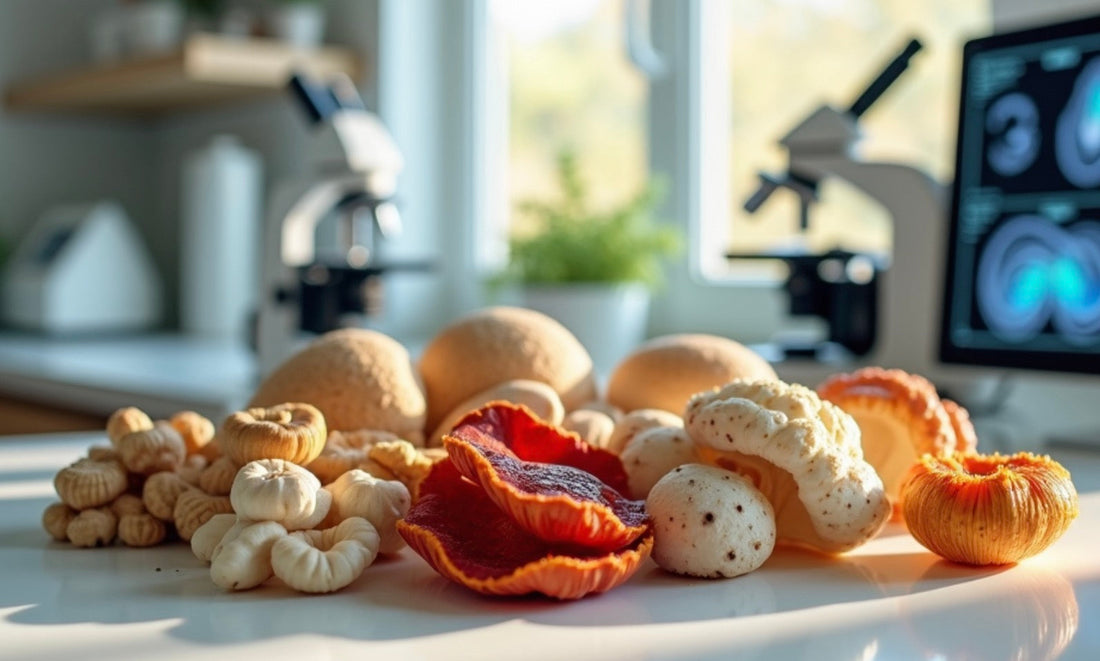
How Medicinal Mushrooms are Transforming Breast Cancer Treatment
06/24/25Share
🧾 Summary
Medicinal mushrooms like Turkey Tail, Reishi, and Maitake are gaining scientific attention for their potential to support breast cancer treatment. This article explores how these fungi modulate the immune system, enhance chemotherapy, and offer direct anti-tumor effects—backed by clinical research and ongoing studies.
⏱️ Estimated reading time: 6 minutes
Medicinal Mushrooms: Revolutionising Breast Cancer Treatment in Modern Medicine

In recent years, medicinal mushrooms have emerged as powerful allies in the fight against breast cancer. With ancient roots in traditional healing practices, these fungi are now being embraced by modern medicine for their potential to enhance traditional treatments.
Rich in bioactive compounds, medicinal mushrooms like reishi, turkey tail, and cordyceps are gaining attention for their immune-boosting properties and ability to reduce side effects of chemotherapy. As research uncovers the intricate ways these mushrooms can bolster the body’s defenses and improve patient outcomes, they offer hope for those navigating the complexities of breast cancer.
This article explores how medicinal mushrooms are not only transforming treatments but also reshaping the narrative of recovery, providing patients with a new avenue for healing and resilience. Join us as we delve into the science and stories behind this innovative approach, spotlighting the synergy between nature and healthcare in the quest for a better quality of life.
In the ever-evolving landscape of cancer therapeutics, an ancient ally has emerged at the forefront of scientific inquiry. Medicinal mushrooms, long revered in traditional medicine systems, are now capturing the attention of oncologists and researchers worldwide for their remarkable potential in breast cancer treatment.</
“Medicinal mushrooms are no longer fringe—they’re becoming vital allies in modern oncology, offering immune support, anti-tumor activity, and improved treatment outcomes.”
The Rising Significance of Mycological Medicine
With breast cancer affecting approximately 55,000 women annually in the UK, the search for effective, integrative treatment approaches has never been more crucial. Recent groundbreaking research has illuminated the profound potential of medicinal mushrooms in oncology, particularly in breast cancer therapy
Key Medicinal Mushrooms in Cancer Care
Several species have emerged as particularly promising in breast cancer research:
- Turkey Tail (Trametes versicolor): Renowned for its immune-boosting polysaccharides
- Reishi (Ganoderma lucidum): Celebrated for its anti-inflammatory properties
- Maitake (Grifola frondosa): Known for enhancing chemotherapy efficacy
- Cordyceps sinensis: Valued for its anti-metastatic potential
Scientific Mechanisms: Understanding the Magic Behind the Mushrooms
The efficacy of medicinal mushrooms in breast cancer therapy isn't merely anecdotal. Modern research has identified several key mechanisms:
1. Immune System Modulation
These fungi contain beta-glucans and other bioactive compounds that significantly enhance natural killer cell activity and regulate cytokine production, effectively strengthening the body's natural defence systems against cancer cells.
2. Direct Anti-tumour Effects
Compounds found in medicinal mushrooms have demonstrated the ability to:
- Induce apoptosis (programmed cell death) in cancer cells
- Inhibit angiogenesis (formation of new blood vessels that feed tumours)
- Reduce cancer cell proliferation
Clinical Evidence and Research Breakthroughs
Recent clinical trials have shown promising results. For instance, studies involving Turkey Tail mushroom supplements have demonstrated:
- Enhanced immune response in breast cancer patients
- Improved recovery rates post-chemotherapy
- Reduced tumour size in some cases
- Better quality of life scores among participants
For more detailed information about medicinal mushrooms and their applications, visit our comprehensive guide.
Integration with Conventional Treatments
“Ancient wisdom meets cutting-edge science as fungi like Reishi and Turkey Tail emerge as powerful complements to conventional breast cancer therapies.”
One of the most promising aspects of medicinal mushrooms is their potential to complement traditional cancer treatments. Research indicates they may:
- Enhance the effectiveness of chemotherapy
- Reduce treatment-related side effects
- Improve overall treatment outcomes
- Support immune system function during conventional therapy
Practical Considerations for Patients
When considering medicinal mushrooms as part of breast cancer treatment:
- Always consult with your oncology team first
- Source products from reputable suppliers
- Follow recommended dosage guidelines
- Monitor your response carefully
Future Directions and Research
The field of mycological medicine in oncology continues to evolve. Current research focuses on:
- Identifying new bioactive compounds
- Optimising delivery methods
- Understanding synergistic effects with conventional treatments
- Developing standardised protocols
Conclusion
The integration of medicinal mushrooms into breast cancer therapy represents a promising frontier in oncology. While more research is needed, the current evidence suggests these natural compounds could play a vital role in comprehensive cancer care strategies.
Call to Action: Interested in learning more about medicinal mushrooms and their potential role in cancer therapy? Consult with your healthcare provider and explore our detailed resources for evidence-based information about these remarkable fungi.

FAQ
Table of contents
This page has been viewed 0 times.
This page has been viewed 0 times.
News















